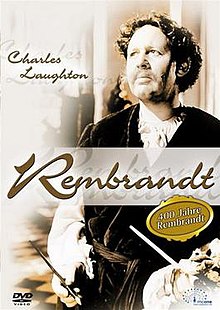Rembrandt (1936 film)
| Rembrandt | |
|---|---|
 DVD Cover | |
| Directed by | Alexander Korda |
| Written by | June Head Lajos Bíró Arthur Wimperis |
| Produced by | Alexander Korda |
| Starring | Charles Laughton Gertrude Lawrence Elsa Lanchester Edward Chapman |
| Cinematography | Georges Périnal |
| Edited by | Francis D. Lyon William Hornbeck (sup) |
| Music by | Geoffrey Toye |
Production company | |
| Distributed by | London Film Productions (US) United Artists (UK) |
Release dates | 6 November 1936 (UK) 25 December 1936 (US) |
Running time | 85 minutes |
| Country | United Kingdom |
| Language | English |
Rembrandt is a 1936 British biographical film made by London Film Productions of the life of 17th-century Dutch painter Rembrandt van Rijn.[1] The film was produced and directed by Alexander Korda from a screenplay by June Head and Lajos Bíró based on a story by Carl Zuckmayer. The music score was by Geoffrey Toye and the cinematography by Georges Périnal.[2]
Cast
- Charles Laughton as Rembrandt van Rijn
- Gertrude Lawrence as Geertje Dircx
- Elsa Lanchester as Hendrickje Stoffels
- Edward Chapman as Carel Fabritius
- Walter Hudd as Frans Banning Cocq
- Roger Livesey as Beggar Saul
- John Bryning as Titus van Rijn
- Sam Livesey as Auctioneer
- Herbert Lomas as Gerrit van Rijn
- Allan Jeayes as Dr. Tulp
- John Clements as Govert Flinck
- Raymond Huntley as Ludwick
- Abraham Sofaer as Dr. Menasseh
- Laurence Hanray as Heertsbeeke
- Austin Trevor as Marquis de Grand-Coeur
- Edmund Willard as Van Zeeland
- Leonard Sharp as Burgher at Auction
- Marius Goring as Baron Leivens (uncredited)
- Alexander Knox as Ludwick's Assistant (uncredited)
- Hay Petrie as Jeweller (uncredited)
Production
Alexander Korda had previously worked with Laughton on the critically successful The Private Life of Henry VIII. Laughton's wife, Elsa Lanchester, has a role in the film as Hendrickje, Rembrandt's maid who also became his lover.
Critical reception
The New York Times wrote, "Charles Laughton and Alexander Korda have produced a great, and rich, and glowing motion picture in "Rembrandt," which opened yesterday at the Rivoli, a picture signed all over with distinction, like one of the master's own canvases";[3] while more recently, Time Out wrote that the film was "Less successful at the time than the earlier Private Life of Henry VIII, but a far better film, thanks to a subtle, touching performance from Laughton as the ageing painter...Surprisingly sombre, it lacks a tight plot, but appeals through its vivid characterisation, superb Vincent Korda sets, and Georges Périnal's lovely camerawork."[4]
Writing for The Spectator in 1936, Graham Greene gave the film a poor review, describing it as "a series of unrelated tableaux". Greene found that "the film is ruined by lack of story ['line'] and continuity [...] [which is the] drive of a well-constructed plot". Greene gave some praise for the acting of Laughton and Lanchester, but condemned the direction stating "I have called the film reverent, but pompous, I fear, would be nearer the mark."[5]
References
- ^ "BFI Screenonline: Rembrandt (1936)". www.screenonline.org.uk.
- ^ "Rembrandt (1936)".
- ^ https://www.nytimes.com/movie/review?res=9D06E5DE1F39EE3BBC4B53DFB467838D629EDE
- ^ "Rembrandt".
- ^ Greene, Graham (20 November 1936). "Rembrandt". The Spectator. (reprinted in: Taylor, John Russell, ed. (1980). The Pleasure Dome. Oxford University Press. pp. 117, 120. ISBN 0192812866.)
Bibliography
- Jerry Vermilye The Great British Films, Citadel Press, 1978, pp 32–35 ISBN 0-8065-0661-X
External links
- Rembrandt at IMDb
- Rembrandt at AllMovie
- Rembrandt at the TCM Movie Database
- Rembrandt at the American Film Institute Catalog
- Rembrandt at the BFI's Screenonline
- Rembrandt is available for free viewing and download at the Internet Archive
- 1936 films
- 1930s historical films
- Biographical films about artists
- British black-and-white films
- British biographical films
- British historical films
- British films
- English-language films
- Films directed by Alexander Korda
- Films based on works by Carl Zuckmayer
- London Films films
- Films set in the 1640s
- Films set in the 1650s
- Films set in the 1660s
- Films set in Amsterdam
- Films produced by Alexander Korda
- 1930s biographical films
- Cultural depictions of Rembrandt
- Biographical film stubs
